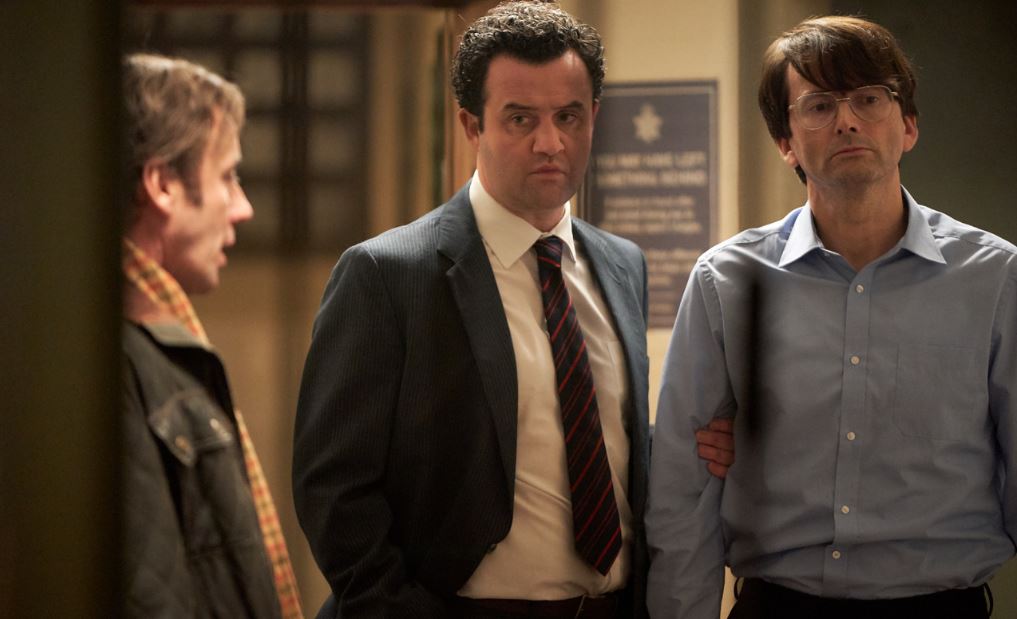| Worth seeing: | for the key performances at the heart of an intellectual examination of the case of one of the most notorious mass killers in recent British criminal history |

| Featuring: | David Tennant, Barry Ward, Daniel Mays, Jamie Parker, Jason Watkins, Laurie Kynaston, Pip Torrens, Ron Cook, Tony Way |
| Key crew: | Lewis Arnold, David Meanti, Brian Masters, Kelly Jones, Luke Neal |
| Channel: | ITV Player, ITV1 |
| Length: | 45 minutes |
| Episodes: | 3 |
| Broadcast date: | 14th September 2020 |
| Country: | UK |
WHAT’S IT ABOUT?
In early 1983, contractors were called to a flat in north London when a drain became blocked. They found bones that appeared to be human.
Two local police officers, Detective Chief Inspector Peter Jay (Daniel Mays) and Detective Inspector Steve McCusker (Barry Ward) are called and arrest the resident of the upstairs flat, Dennis Nilsen (David Tennant), when he returns home.
Nilsen – or Des, as he likes to call himself – is surprisingly free with the information he provides them; over the past five years, he’s killed fifteen young men, he declares casually in the back of the police car.
But during the questioning that follows, he becomes less and less co-operative as he starts to enjoy the power he has over the detectives. He won’t tell them the identities of any of his victims and when he’s finally charged, he throws in a curve-ball: having described all along how he’d lured men back to his flat and killed them, he pleads not guilty to murder.
To get justice for his more than a dozen victims, DCI Jay will have to provide enough evidence to persuade the jury that Nilsen set out to kill the young men – or else he’ll be convicted of manslaughter, by reason of insanity, which could see him back on the streets in a few short years.
WHAT’S IT LIKE?
ITV’s three-part drama is based on Killing For Company by the real-life crime-writer Brian Masters, portrayed in the series by Jason Watkins, as an author, conflicted between getting the best material for his book and not getting in the way of justice.
In a series of meetings before and during the trial, Masters provided Nilsen with an outlet to vent, making the police fear that he was obstructing their investigation.
The police, meanwhile, grow more and more frustrated as prosecutors appear to be trying to limit the extent of their investigation, the more difficult Nilsen makes it for them to gather evidence.
Nilsen himself then grows frustrated as he realises that Masters might not be giving him quite the fame and notoriety he had expected.
David Tennant’s cocky and self-assured mass murderer is a creepy character to build a three-part series around, as he’s not the kind of person anyone would want to spend much time with, unless they want to end up in bits down his drain – or in a pot on his hob.
Daniel Mays excels as the diligent detective, determined to get justice for as many of the victims as those above him allow.
There’s a little excess back-story for DCI Jay at the start, which disappears as quickly as Nilsen’s victims, allowing Mays to lead the audience on his journey of frustration and determination.
The first two episodes are effective, but run into the buffers until episode three, and the start of the trial, throws coal in the engine.
It’s a relatively recent piece of criminal history that many viewers will remember from when it happened, which detracts from the drama to an extent – most people will know how it ends – but the court case, provides a fascinating insight into the judicial process and provokes interesting discussion about the definition of sanity, in relation to the difference between a murder and manslaughter conviction.
What Nilsen did was clearly thought out, pre-planned and calculated, but surely no sane person would do that – would they?
Des has been criticised by some for giving a platform to Nilsen, almost humanising him as he dispassionately pontificates about why he did what he did and how he tried to excuse it.
It’s a grisly story, told without the grissle – it unfolds, almost theatrically, through people talking to each other – police talking to the killer, a writer talking to the killer, police talking to survivors or victims’ relatives, lawyers talking to everyone. With the suspect in custody from the very first scene, all that’s being chased are the facts.
It’s a well-told, intellectual exercise, with notable performances from Tennant, Mays and Watkins, that provides more talking points than nail-biting drama and never really answers many of the questions is poses.
